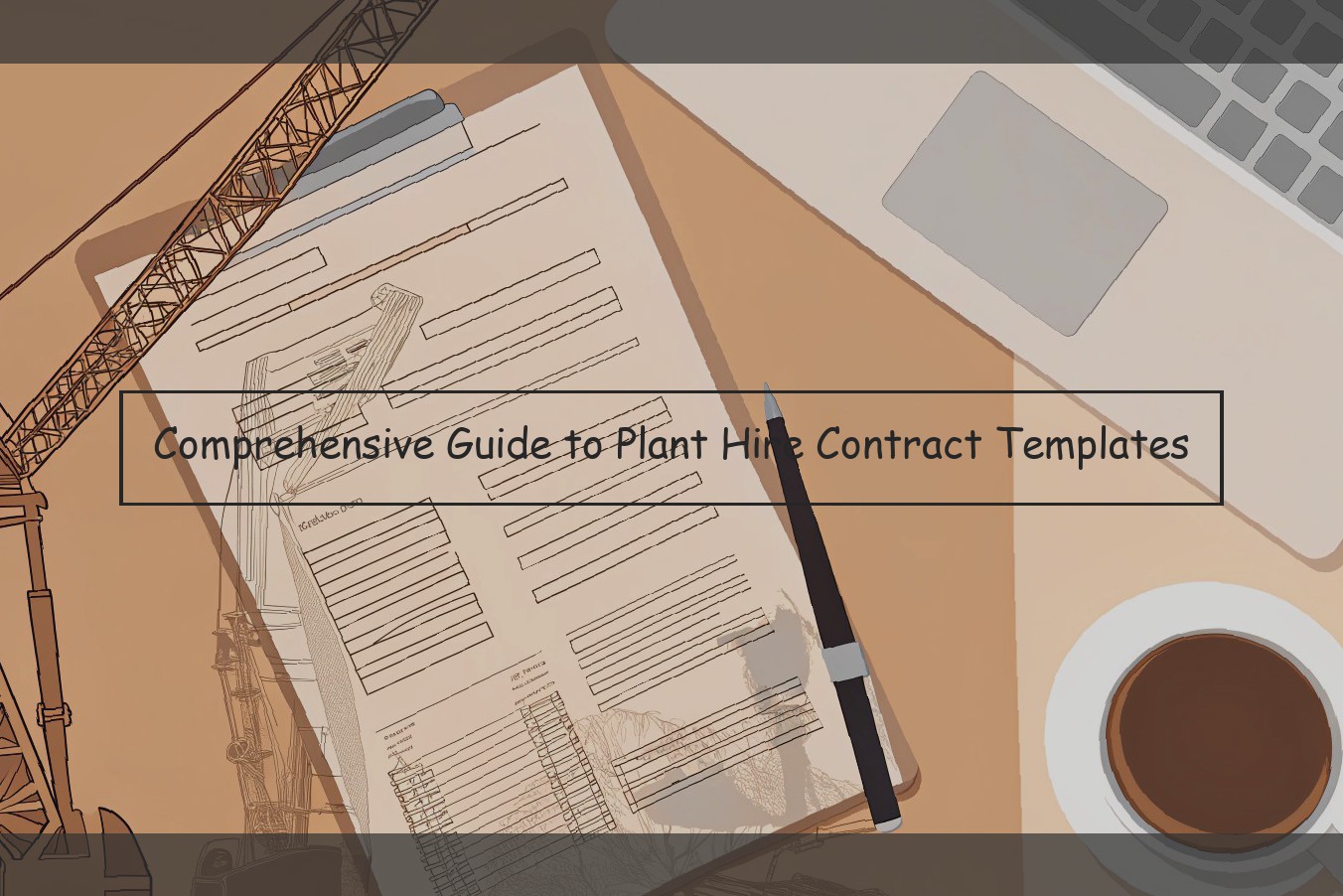
All You Need to Know about Plant Hire Contracts
Plant hire contracts are agreements that set out the terms and conditions for leasing or hiring equipment and machinery from a plant hire company. They form a fundamental aspect of the equipment rental industry, providing a legal framework within which the relationship between the supplier and the customer is defined.
A well-drafted plant hire contract should contain essential details concerning the plant being hired, such as its make and model, any hire charges, the duration of the hire, the terms of payment, and any services to be provided by the plant hire company, including delivery/collection and safe operation of plant items.
The purpose of these contracts is to protect the interests of both parties to the contract . For the plant hire company, the contract provides an opportunity to set out their terms and any limitations on their liability in the event the plant is damaged or goes missing whilst in the possession of the customer. For the customer, the contract offers clarity and certainty regarding the limitations of the use of the hire equipment and the types of use that should be avoided. The contract may also deal with responsibilities such as site security, access and obtaining relevant permits.
Like all contracts, a plant hire contract is binding in law. There are some risks that exist when hiring machinery/equipment such as plant not being fit for purpose, failure of the machine to operate correctly, or delivery and collection issues arising. A plant hire contract goes a long way to mitigating these risks and ensuring the parties’ expectations are managed in a clear and transparent manner.
The Core of a Plant Hire Contract Template
A plant hire contract template should always contain certain key elements and clauses. Failure to do may mean that the documents are not binding, or not legally enforceable – and this is never a good situation when it comes to business. The first thing that your plant hire contract template should do is clearly set out the parts of the contract. The names of the people involved, along with their businesses and contact details should be included so that everyone knows exactly where they stand. There needs to be a clear description of the hired equipment itself, including the quantity and what condition it is in. If possible, images should be attached to the plant hire contract so that there is no doubt as to what has been agreed and there can be no confusion by any party as to whether or not they have received exactly what they paid for. Timescales are crucial in any contract and should be clearly set out so that neither party is disadvantaged by an unclear time period. Like the condition of equipment, timescales and many other key elements of a plant hire contract template, should be agreed and set out clearly, so that there is no room for miscommunication. Once the contract starts and ends should be clearly defined, as well as payment terms. Are there any penalties for breakages or damage – or any early termination penalties? All of these elements are important and should be clearly defined so that there are no grey areas to challenge later on. Should you need to edit an existing template or create one from scratch, you will find it all too easy to forget these key components of a contract. To avoid being taken advantage of and to ensure that your contract will stand up to scrutiny should it be challenged by either party, clear definitions should always be set out.
Advantages of a Template
The primary benefit of templatizing your plant hire contracts is to ensure that your business is compliant on all the statutory positions pertinent to a plant hire operation. An overlooked benefit is that it saves time in the negotiation process by avoiding unnecessary back and forth and keeping information in time and space -relevant order. A well-drafted contract should be easily understood and clearly written. Another advantage is that a good contract template sets out how you operate and make decisions in your business. It will contain terms and conditions that are already tried and tested and help you understand where your company stands against others in the industry. You can use that knowledge to your advantage when negotiating your contracts with customers.
How to Personalize Your Template
Customizing your template is a crucial step in ensuring that all aspects of the agreement are covered and tailored to your specific requirements. First, carefully review the original plant hire contract template to gain an understanding of the key clauses and provisions. Secondly, identify any additional clauses that may be necessary for your specific project or client. For example, if the plant hire will be for a longer duration than usual, you may need to add clauses related to maintenance and servicing requirements. Thirdly, modify any wording that may not be applicable or relevant to your project. Ensure that all blanks are filled in with the correct information, including the names of the parties, hire dates, and fees. Lastly, review the final document to ensure all necessary provisions are included and the information is accurate before issuing for signature.
Typical Mistakes in Plant Hire Contracts
Even though the terms of these contracts are usually straightforward, there are still several common mistakes to watch out for when hiring out or hiring in plant equipment. Failure to look out for these issues can lead to unexpected legal or operational problems down the line.
- Failure to specify how the plant will be maintained: This is an important issue that many people overlook when drawing up a plant hire contract. The contract should state specifically who is responsible for the maintenance of the plant equipment while it is being used. It’s worth specifying what maintenance looks like: How and when will it be carried out? How will it be recorded? What happens if the plant breaks down or is not maintained properly? When will the equipment be returned for maintenance?
- Allotting unlimited time to examine the plant: It is not uncommon in plant hire contracts to allow the hirer to have unlimited time to examine the plant before committing to the hire. This can really slow down the process of initial inspection and plant hire and make the hirer less than enthused to work with you in the future. We recommend limiting the time period of initial inspection to a small number of hours or days, and allowing for a longer period if there is a more serious concern with the plant. This way , both parties have the space to examine the equipment effectively without causing unnecessary complications in the hiring process.
- Verbal agreements: Parties may think they require only one page to set out the terms of their agreement, and think the deal is done after they shake hands. However, verbal agreements are not legally enforceable in option contracts. A proper written contract is needed to ensure the agreement is legally binding. The best way to avoid this situation is to have a standard plant hire contract template, to which you can easily add your terms and conditions and the specific details of the hire when drawing up the contract. An explicit, individualised contract is essential to protect your company.
- No cancellation policy: Sometimes hirers will need to cancel their hire at short notice, with little warning. Having a clear cancellation policy within the contract will prevent them from blaming you, and causing grief between your company and their own, when they need to cancel at the last moment.
Occasional glitches happen, so it is always wise to have a cancellation policy set out in the contract in order to prevent disagreements over short-notice cancellations in plant hire contracts.
Legal Aspects of Plant Hire Agreements
Plant hire contracts must comply with a variety of legal requirements. Plant hire contracts will often be considered to be subject to the Supply of Goods and Services Act 1982, which applies the common law Sale of Goods Act 1979 and the Sale of Goods (Amendment) Act 1994. The Supply of Goods and Services Act 1982 imposes terms that are considered to be implied into plant hire agreements where damage to the plant or equipment is foreseeable as a result of lack of care from either the plant owner or the hirer and obliges the owner to maintain and repair the plants and equipment. The Supply of Goods and Services Act 1982 also requires the plant owner to provide plant and equipment of satisfactory quality and to use reasonable skill and care when carrying out any work, including repair or maintenance. The Supply of Goods and Services Act 1982 is implied in all contracts of sale and agreements for the hire of goods unless the parties to the contract agree otherwise, so it is advised to include disclaimers within any plant hire contract template to assist the dissipation of any implied terms under the Supply of Goods and Services Act 1982.
Sources for Trusted Templates
Plant hire contract templates can often be found across a variety of online platforms and sources, though the quality of these templates can vary markedly. The importance of picking a reliable and proven provider cannot be understated.
Firstly, many organisations that oversee construction law and safety regulations provide trusted document templates. These typically include updates and changes in relevant insurance requirements or industry rules. For example, the Federation of Small Businesses provides a template for plant hire contracts that incorporates Council of Mortgage Lenders guidelines.
Similarly, organisations that oversee safety regulations for machinery and equipment hire and ensuring that your template hire contract meets safety obligations are provided by the Health and Safety Executive .
Construction industry publication Builders’ Merchant Journal has provided a downloadable plant hire agreement template on their website for many years.
Construction industry-specific services such as Construction Online and Construction Industry News also have been known to provide high-quality plant hire agreement templates.
The most straightforward source of templates, however, may be to search amongst shrewd plant hire companies that have made their contracts publically searchable and accessible online. A few that do so include:
Many third party resources exist that will produce custom-made plant hire contracts for a fee. However, few are better than simply working with lawyers that are experienced in producing documents that are industry specific. One such service that provides fully bespoke plant hire contracts is That Legal Company – which operates in both England and Scotland.


